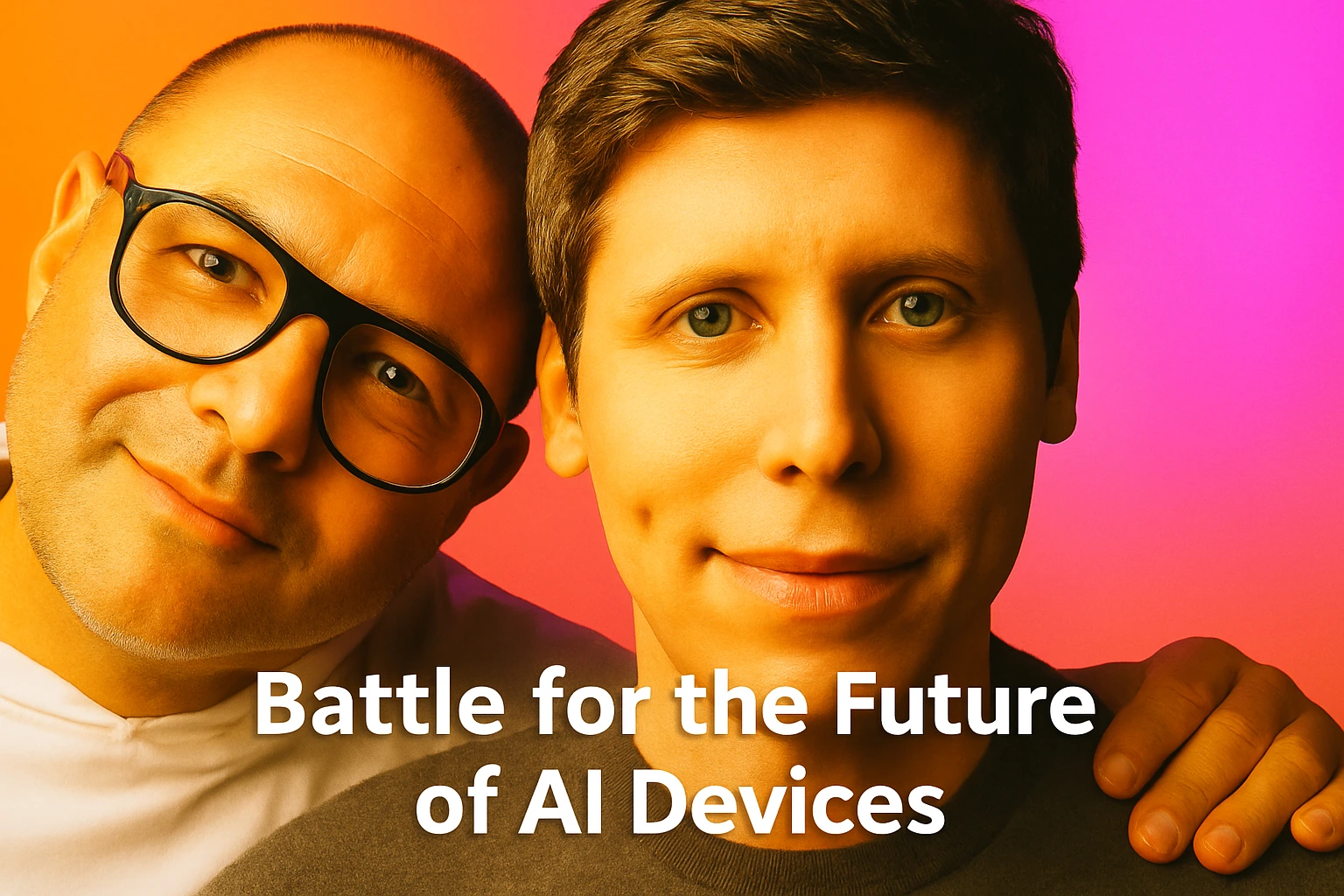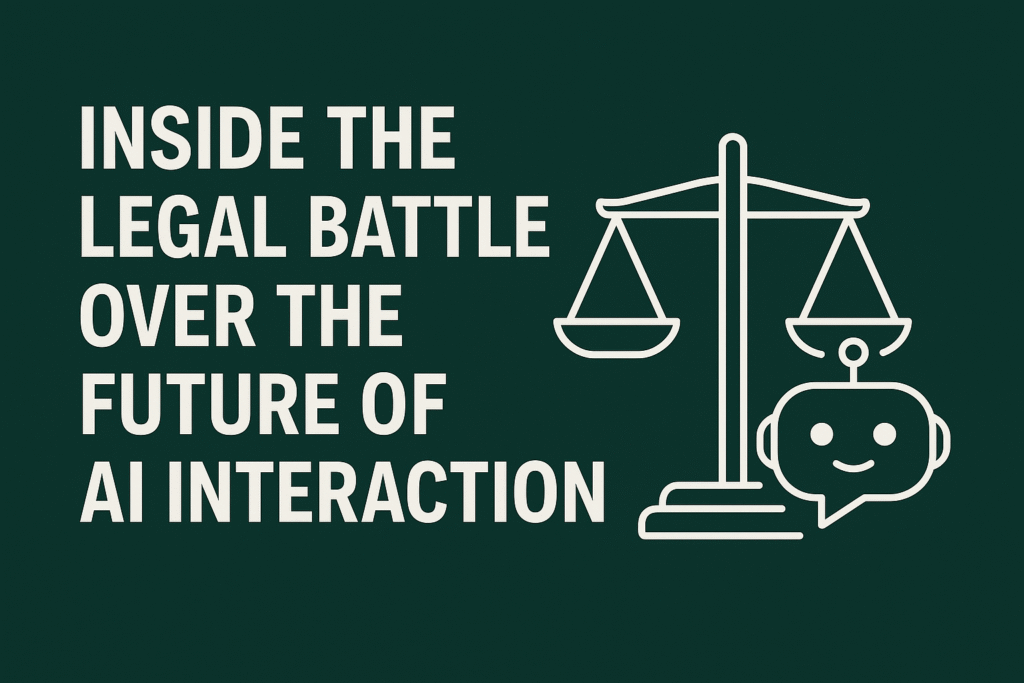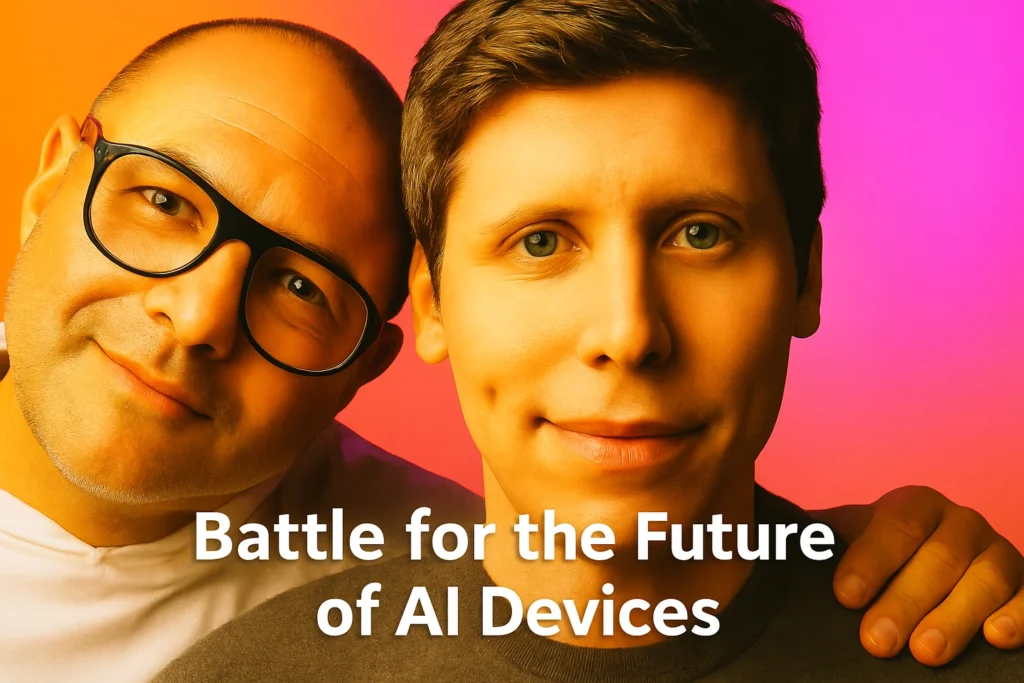AI Hardware Showdown: OpenAI in Court

Table of Contents
AI Hardware Showdown: OpenAI in Court
The quiet race to reimagine our relationship with AI has suddenly become loud and widely known. At the center of this legal drama is OpenAI, known for building some of the world’s most powerful AI tools. The company, now working with legendary iPhone designer Jony Ive, is facing serious legal pushback over a mysterious new hardware project.
The idea behind it is big: move away from screens and smart speakers, and create a more natural, seamless way to connect with AI. Think of it as the future of communication—an AI interaction device that feels more human.
One startup says the idea was theirs first.
The tech startup iyO Inc. is suing OpenAI, Ive, and CEO Sam Altman for secretly developing its own AI hardware. They claim OpenAI’s newly announced venture—called “io Products”—uses a name and ideas that are strikingly similar to their own. OpenAI reportedly acquired the io venture for a staggering $6.5 billion.
A federal judge recently sided with iyO—at least enough to let the case move forward. The judge also ordered OpenAI and its partners to stop using the “io” branding for now. That includes taking down the new venture’s web content until a hearing later this year.

The legal heat didn’t stop there
iyO recently filed a second case, this time alleging that Dan Sargent, a former executive, shared private product information. Sargent, now with Apple, allegedly met with one of the designers behind “io” after leaving iyO—a designer closely linked to Jony Ive.
Jason Rugolo, CEO of iyO, says he pitched his early AI interaction device designs to teams tied to Altman and Ive back in 2022. Later, at a TED Talk, he shared the idea with the world. According to Rugolo, he never thought things would get to this point.“We’re not trying to make enemies,” he said. “But we can’t stay quiet when we believe someone used their power to take our work.”

Inside the Legal Showdown Over the Next Big AI Interaction Device
Altman, for his part, says the name “io” comes from the term “input/output” and that he and Ive came up with it independently. He also pointed out that other companies—like Google—have used the I/O name before. According to him, OpenAI bought the io.com domain in 2023 with a plan to build something entirely new.
What that something is—an AI interaction device that changes how we talk to machines—remains tightly under wraps. But it’s clear this battle isn’t just about a name. It’s about who gets to shape the future of how we connect with AI.



n658uf
pb8ch1
7w8so2
Сливы курсов ЕГЭ профильная математика https://courses-ege.ru
telecharger 1xbet cameroun telecharger 1xbet apk
Портал о строительстве домов https://doma-land.ru проекты и сметы, сравнение технологий (каркас, газобетон, кирпич, брус), фундамент и кровля, инженерия и утепление. Калькуляторы, чек-листы, тендер подрядчиков, рейтинги бригад, карта цен по регионам, готовые ведомости материалов и практика без ошибок.
Квартира с отделкой https://новостройкивспб.рф экономия времени и предсказуемый бюджет. Фильтруем по планировкам, материалам, классу дома и акустике. Проверяем стандарт отделки, толщину стяжки, ровность стен, работу дверей/окон, скрытые коммуникации. Приёмка по дефект-листу, штрафы за просрочку.
Компания «СибЗТА» https://sibzta.su производит задвижки, клапаны и другую трубопроводную арматуру с 2014 года. Материалы: сталь, чугун, нержавейка. Прочные уплотнения, стандарты ГОСТ, индивидуальные решения под заказ, быстрая доставка и гарантия.
срочно деньги займ https://zaimy-54.ru
срочно нужен займ https://zaimy-57.ru
услуга займа микрозайм за 10 минут онлайн
займ на карту https://zaimy-63.ru
взять займ на карту https://zaimy-61.ru
займ онлайн без отказа https://zaimy-65.ru
где взять займ https://zaimy-67.ru
займ онлайн без отказа займы
займ без процентов https://zaimy-71.ru
займы онлайн https://zaimy-78.ru
займ на карту срочно получить займ на любую карту
нужен займ мфо https://zaimy-73.ru
займ на карту займ всем
займ без процентов https://zaimy-80.ru
взять займ онлайн https://zaimy-82.ru
займ срочно https://zaimy-87.ru
займы онлайн на карту https://zaimy-88.ru
срочно деньги займ все займы рф
кредитная карта займ микрозайм без отказа и звонков
Скачать видео с YouTube https://www.fsaved.com онлайн: MP4/WEBM/3GP, качество 144p–4K, конвертация в MP3/M4A, поддержка Shorts и плейлистов, субтитры и обложки. Без регистрации, быстро и безопасно, на телефоне и ПК. Используйте только с разрешения правообладателя и в рамках правил YouTube.
займы деньги займ быстрый
займ онлайн срочно оформить займ онлайн
займы онлайн бесплатно онлайн займ
Найдите лучший товар на https://n-katalog.ru: подробные карточки, честные отзывы, рейтинги, фото, фильтры по параметрам и брендам. Сравнение цен, акции, кэшбэк-предложения и графики изменений. Примите уверенное решение и переходите к покупке в удобном магазине.
займы онлайн бесплатно займ онлайн бесплатно
На портале https://fotoredaktor.top нашёл объяснение, что такое чиназес.
Список на https://siviagmen.com майстрів вразив кількістю міст.
В статье https://buybuyviamen.com подробно писали про односкатную крышу из профнастила.
На сайті mr-master.com.ua знайшла класні ідеї бюджетної веранди.
На сторінці zebraschool.com.ua замовляв ремонт автомагнітоли у Вінниці — зробили якісно
Доставка пиццы в Туле https://pizzacuba.ru горячо и быстро. Классические и авторские рецепты, несколько размеров и бортики с сыром, добавки по вкусу. Онлайн-меню, акции «2 по цене 1», промокоды. Оплата картой/онлайн, бесконтактная доставка, трекинг заказа.
Energy Storage Systems https://e7repower.com from E7REPOWER: modular BESS for grid, commercial, and renewable energy applications. LFP batteries, bidirectional inverters, EMS, BMS, fire suppression. 10/20/40 ft containers, scalable to hundreds of MWh. Peak-saving, balancing, and backup. Engineering and service.
Moldova – rent-auto.md/ro/ – Inchiriere auto Chisinau – arenda masini fara stres, rezervare rapida si cele mai bune preturi.
Mapa ostrva https://fotoredaktor.top Bali pomogla nam puno.
Академия Алины Аблязовой https://ablyazovaschool.ru обучение реконструкции волос для мастеров и новичков. Авторские методики, разбор трихологических основ, отработка на моделях, кейсы клиентов. Онлайн и офлайн, сертификат, поддержка кураторов, материалы и чек-листы.
ЛідерUA – інформативний портал https://liderua.com новин та корисних порад: актуальні події України, аналітика, життєві лайфхаки та експертні рекомендації. Все — щоб бути в курсі й отримувати практичні рішення для щоденного життя та розвитку.
Самое ценное у нас: https://journal-ua.com/health/stomatologiya-vilida-na-oboloni-povnij-tsikl-yakisnogo-likuvannya-zubiv.html
Авторский MINI TATTOO https://kurs-mini-tattoo.ru дизайн маленьких тату, баланс и масштаб, безопасная стерилизация, грамотная анестезия, техника fine line и dotwork. Практика, разбор типовых косяков, правила ухода, фото/видео-съёмка работ. Материалы включены, сертификат и поддержка сообщества.
Курсы маникюра https://econogti-school.ru и педикюра с нуля: теория + практика на моделях, стерилизация, архитектура ногтя, комбинированный/аппаратный маникюр, выравнивание, покрытие гель-лаком, классический и аппаратный педикюр. Малые группы, материалы включены, сертификат и помощь с трудоустройством.
changan uni s купить https://changan-v-spb.ru
Онлайн-блог https://intellector-school.ru о нейросетях: от базовой линейной алгебры до Transformer и LLM. Пошаговые проекты, код на Git-стиле, эксперименты, метрики, тюнинг гиперпараметров, ускорение на GPU. Обзоры курсов, книг и инструментов, подборка задач для практики и подготовки к интервью.
Освойте режиссуру https://rasputinacademy.ru событий и маркетинг: концепция, сценарий, сцена и свет, звук, видео, интерактив. Бюджет и смета, закупки, подрядчики, тайминг, риск-менеджмент. Коммьюнити, PR, лидогенерация, спонсорские пакеты, метрики ROI/ROMI. Практические задания и шаблоны документов.
Курсы по наращиванию https://schoollegoart.ru ресниц, архитектуре и ламинированию бровей/ресниц с нуля: теория + практика на моделях, стерильность, карта бровей, классика/2D–4D, составы и противопоказания. Материалы включены, мини-группы, сертификат, чек-листы и помощь с портфолио и стартом продаж.
PRP-курс для косметологов prp терапия обучение доказательная база, отбор пациентов, подготовка образца, техники введения (лицо, шея, кожа головы), сочетание с мезо/микронидлингом. Практика, рекомендации по фото/видео-фиксации, юридические формы, маркетинг услуги. Сертификат и кураторство.
Онлайн-курсы обучение прп: структурированная программа, стандарты стерильности, подготовка образца, минимизация рисков, протоколы для лица/шеи/кожи головы. Видеолекции и задания, разбор клинических ситуаций, пакет шаблонов для ведения пациента, экзамен и получение сертификата.
Самое интересное клик: https://version.com.ua
Новости кино сегодня https://fankino.ru
Онлайн-займ https://zaimy-89.ru без очередей: заполните форму, получите решение и деньги на карту. Выгодные ставки, понятный договор, кэшбэк и скидки при повторных обращениях. Напоминания о платежах, продление при необходимости. Выбирайте ответственно и экономьте.
Фото из армии что за сайт Prosoldat профессиональная съёмка армии: присяга, парады, учения. Создаём армейские альбомы, фотокниги, постеры; ретушь и цветокор, макеты, печать и доставка. Съёмочные группы по всей стране, аккредитация и дисциплина, чёткие сроки и цены.
Мучает зуд и жжение? Геморой – лечение без боли и очередей: диагностика, консервативная терапия, латексное лигирование, склеротерапия, лазер. Приём проктолога, анонимно, в день обращения. Индивидуальный план, быстрое восстановление, понятные цены и поддержка 24/7.
chery tiggo купить купить chery
Главное кликните сюда: https://rx24.ru/obshhestvo/bloknoty-s-logotipom-rol-v-korporativnoj-atributike-i-brendinge.html